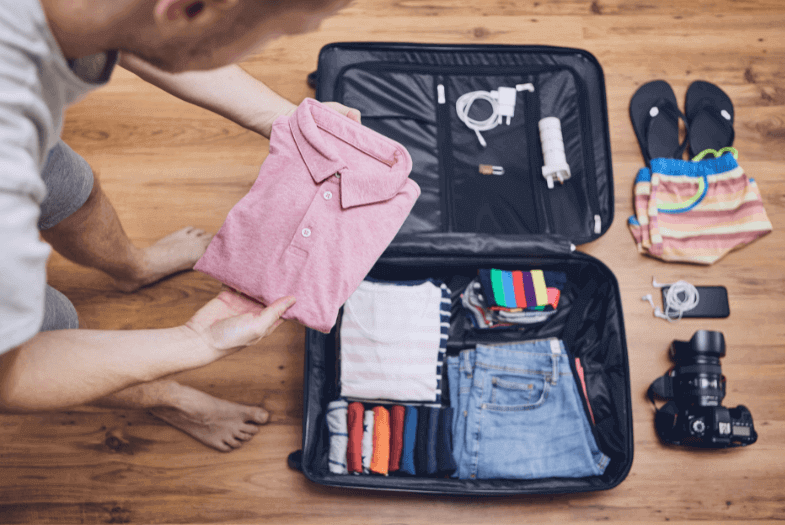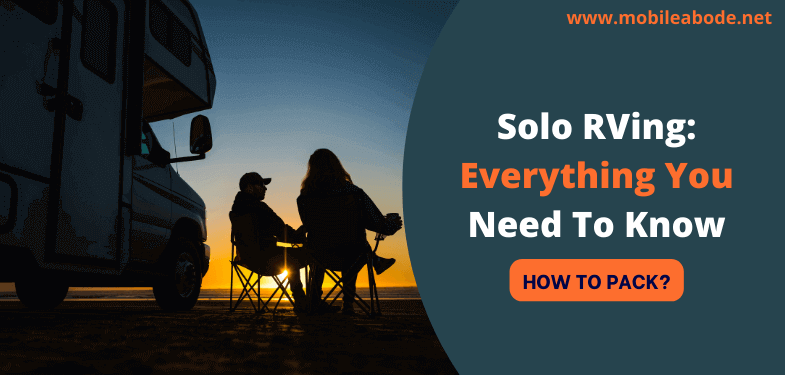Are you curious about solo RVing? Do you want to know if it’s right for you before taking the plunge?
In this blog post, we’ll discuss some of the basics of solo RVing and what you need to think about before setting out on your own. So, read on to learn more!
Solo RVing: How To Get Started?
Solo RVing can be a fun and rewarding experience but it does come with its own set of challenges.
Here are a few things to keep in mind if you’re thinking about embarking on a solo RV trip:
1) Choose the right RV
Not all RVs are created equal and some are better suited for solo travelers than others. If you’re planning on spending a lot of time on the road by yourself, look for an RV that’s easy to drive and maneuver.
Smaller RVs like Class B motorhomes or travel trailers are often a good choice for solo travelers since they’re easier to handle than larger rigs.
2) Stock up on supplies
When you’re RVing by yourself, you need to make sure you have all the supplies you need before hitting the road. This includes food, water and any other essentials like medicine or camping gear.
3) Be prepared for emergencies
No one likes to think about emergencies, but when you’re traveling solo it’s important to be prepared for anything. Make sure you have a first-aid kit and a plan for what to do if something goes wrong.
4) Enjoy the experience
Solo RVing can be a great way to see the world and enjoy some quality time by yourself. Just remember to relax and enjoy the ride!
Why might someone choose to do solo RVing?
There are many reasons why someone might choose to do solo RVing.
One reason might be that they enjoy the independence and self-sufficiency that comes with being on their own. Another reason might be that they prefer the intimate experience of exploring new places by themselves rather than with a group.
Whatever the reason, solo RVing can be a great way to travel and see the world.
Benefits of solo RVing
1) You can go at your own pace
When you’re RVing solo, you’re in charge. You can choose to take things slow and enjoy the scenery or make good time and cover the ground.
2) It’s cheaper
Traveling solo in an RV is usually cheaper than traveling with a group because you only have to pay for one campsite, one gas tank, and one set of food and supplies.
3) You can meet new people
One of the best things about RVing is the community of friendly fellow travelers you’ll meet along the way. When you’re solo RVing, it’s easy to strike up a conversation and make new friends.
4) You can learn more about yourself
RVing solo is the perfect opportunity to get to know yourself better. With no one else to rely on, you’ll have to be resourceful, independent and self-sufficient.
How to Prepare for a Solo RV Trip?

If you’re planning a solo RV trip, there are a few things you should do to prepare.
1) Your vehicle is in good working order
Before setting out on any road trip, it’s important to make sure your vehicle is in good working order. This is especially true for a solo RV trip, as you’ll be reliant on your vehicle for both transportation and shelter.
Make sure to check your oil level, tire pressure and fluid levels before hitting the road.
2) Bring along plenty of food and water
No matter how long your trip is, it’s always a good idea to bring along plenty of food and water. This will help you to avoid getting hungry or thirsty while on the road.
It’s also a good idea to bring along some snacks for when you get peckish.
3) Bring along a map of the area
If you’re unfamiliar with the area you’ll be traveling through, it’s a good idea to bring along a map. This will help you to avoid getting lost and will also give you a good idea of where you are and where you’re going.
4) You have a good idea of your route
Before setting out, it’s important to have a good idea of your route. This means knowing which roads you’ll be taking and which destinations you’ll be stopping at along the way.
5) Stay safe
Finally, be sure to stay safe by following some basic safety precautions. With a little planning and preparation, you can have a great time on your solo RV trip.
What to pack for a solo RV trip?
There are a few things you’ll want to make sure to bring along on your trip:
- Set of tools in case of emergencies.
- Flashlight.
- Cell phone and charger.
- Non-perishable food and water.
- Stove and fuel.
- Bedroll or sleeping bag.
- Clothing appropriate for the climate.
- Hiking boots or sneakers.
- Sunscreen and insect repellent.
- Camera to document your trip!
How to find campsites and deals on camping?
There are a few ways that you can find campsites and deals on camping.
- One way is to search online. Many websites offer listings of campgrounds in specific areas.
- Another way is to contact the tourism office in the area where you would like to camp. They may be able to provide you with information about campgrounds and discounts or deals that are available.
- You can also ask friends or family members if they know of any good campgrounds in the area. They may have personal experience with a particular campground and be able to give you first-hand information.
Tips for staying safe while traveling solo in an RV
- Do your research before you go. Map out rest stops, gas stations, and camping spots ahead of time so you’re not left stranded in the middle of anywhere.
- Drive during the day. If possible, avoid driving at night. Not only is it harder to see potential hazards, but you’re also more likely to be tired and make mistakes.
- Be aware of your surroundings. When you’re stopped, make sure all the doors and windows are locked.
- And when you’re driving, pay attention to what’s going on around you.
- Trust your gut. If something doesn’t feel right, it probably isn’t. Go with your instincts and get out of there if you can.
- Tell someone where you’re going. Before you head out on your trip, let a friend or family member know your route and expected arrival times.
FAQs – Solo RVing
How do I get started living in an RV?
There are a few things you should do to get started living in an RV:
- Choose the right RV for you: There are many different types and sizes of RVs, so it’s important to choose one that will fit your needs.
- Learn how to operate and maintain your RV: This includes learning how to hook up to water and sewer, how to dump your holding tanks, and how to winterize your RV.
- Stock your RV with the supplies you need: This includes food, cookware, bedding, clothes, and other items you may need for day-to-day life.
- Find a place to park your RV: This may be a campground, RV park, or other location.
How do full-time RVers save money?
Full-time RVers can save money in several ways:
- Buying an RV instead of a traditional home can save you a lot of money upfront.
- Not having to pay for rent or a mortgage can also save you a lot of money.
- RV living can also help you save on utilities and other bills.
- Full-time RVers can also save money by cooking at home and avoiding eating out.
- Finally, many full-time RVers choose to work while they travel, which can help them earn money to offset their living expenses.
What state is best for full-time RVers?
There is no “best” state for full-time RVers, as each state has its own set of benefits and drawbacks.
However, some states may be better suited for full-time RVers than others. For example, states with warmer climates may be better for those who want to avoid cold weather while states with a lower cost of living may be more budget-friendly.
How do you live in an RV in the winter?
There are a few things you can do to live in an RV in the winter:
- Install a good heating system in your RV: This will help keep you warm in the cold weather.
- Add extra insulation to your RV: This will help keep the heat in and the cold out.
- Use space heaters judiciously: Space heaters can help supplement your main heating system, but they can also be a fire hazard if used improperly.
- Dress warmly: This includes wearing layers of clothing and using blankets and other bedding to stay warm at night.
- Keep your RV well-ventilated: This will help prevent condensation and mold from forming in your RV.
Final words
If you’re thinking of taking a solo RV trip, we’ve got everything you need to know to get started! From choosing the right vehicle and packing essentials to preparing for your journey and finding campgrounds along the way, we’ll guide you through every step.
So Now you just need to take first steps towards nature!

